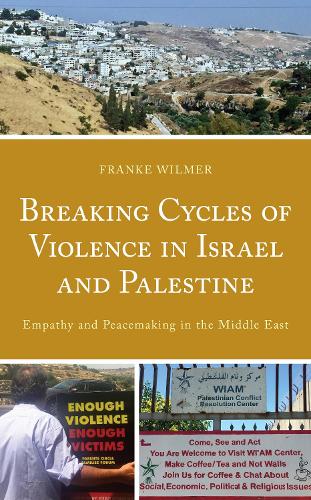
Breaking Cycles of Violence in Israel and Palestine: Empathy and Peacemaking in the Middle East
(Hardback)
Publishing Details
Breaking Cycles of Violence in Israel and Palestine: Empathy and Peacemaking in the Middle East
By (Author) Franke Wilmer
Bloomsbury Publishing PLC
Lexington Books
2nd February 2021
United States
Classifications
Professional and Scholarly
Non Fiction
956.04
Physical Properties
Hardback
264
Width 162mm, Height 229mm, Spine 25mm
567g
Description
Victimization narratives arise out of the experience of historical and ongoing injury, and often intersect or, in part, constitute identity narratives. Unless transformed through reconciliation, these narratives can be used by political leaders to mobilize and perpetuate violence. Victimization narratives are grounded in lived experiences, whether by contemporary generations or passed on from one generation to another as a historical narrative about the prior experience of victimization. Therefore, cycles of violence cannot be ended sustainably unless those narratives are transformed; and first, narratives of victimization and cycles of violence must be disrupted. This is the work of many peace activists in Israel and Palestine whose relationships are built on empathic engagement. This book reviews theories of empathy across a broad range of scholarly work. It then applies a framework of political psychology to understand the role of empathy in the accounts of peace activists whose identities as victims were transformed by their empathic engagement. It includes a chapter providing historical background, and concludes with a consideration of alternative futures for the Israeli and Palestinian people and communities.
Reviews
Franke Wilmer states that outsiders cannot fully understand what protagonists in armed conflict feel and experience. Nonetheless, sometimes an empathetic outsider can understand more than actual participants, provided they are truly open to the expressions of those to whom they are listening. Franke Wilmer has managed to do this, and much more. I believe she has captured the essence of the experience and the feelings of those involved, grasping their often involuntary sense of victimhood but also their (our) wishes to change realty and to meet the "other" at least halfway. Hers is truly a narrative that ascends above blame or guilt and reveals the core of a complex yet encouraging - sometimes painful - effort by protagonists of a conflict to make a difference.
--Galia Golan, Professor Emerita, Hebrew University of JerusalemIn her book, Franke Wilmer takes you with her on a journey to meet the unknown soldiers of peace struggling to find light in the midst of darkness. Written by an expert in the field, this book fills a gap in the conflict resolution library. It offers a balanced perspective on the challenges facing peacemaking in the region. Scholars and academics interested in topics of empathy, nonviolence, and peace should include this book on their recommended reading list for their students.
--Mohammed S. Dajani Daoudi, Founder, Wasatia Movement - PalestineIn Victimization, Empathy, and Breaking the Cycle of Violence in Israel and Palestine, Franke Wilmer turns to one of the most intractable conflicts in the contemporary world. Her analysis takes into account the specific history and politics of the region as well as the salience for intergenerational conflict of narratives of victimization and moral exclusion. Relying on theory and the testimonies of Israeli and Palestinian peacemakers, Wilmer advocates empathic engagement as a political practice. With deftness, realism, and hope, Wilmer also demonstrates empathic engagement as a scholarly practice.
--Cynthia Burack, The Ohio State UniversityThis book by Franke Wilmer gives hope to those who observe bloody and lasting conflict in the Middle East that began over 100 years ago. She not only bases her optimism on psychological mechanisms of empathy and identity, but introduces the reader to actors involved in the conflilct who refuse to engage in the bloodshed and have successfully built a framework that makes the transformation of hate and animosity into closeness, friendship, and reconciliation possible. It is an important book that assembles the narratives of these people to show that peacemaking is possible.
--Daniel Bar-Tal, Tel Aviv UniversityAuthor Bio
Franke Wilmer is professor at Montana State Univerity.
